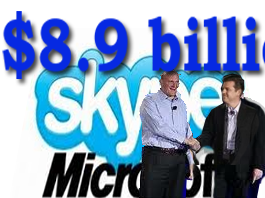Two weeks ago the School of Medicine of the University of Pennsylvania received a record $225 million gift for its medical school endowment. The donors, the Perelman family said:
“Ruth and I believe the future of medicine depends on the ability to produce world-class clinicians and researchers, the hallmarks of Penn and a Penn education,” Perelman said in a statement.
The University said the money wouldl allow Penn to increase  financial aid, reducing loan burdens can enable students to enter the most-needed areas of medicine instead of the most lucrative. The funds also will help boost research and recruit more faculty.
financial aid, reducing loan burdens can enable students to enter the most-needed areas of medicine instead of the most lucrative. The funds also will help boost research and recruit more faculty.
The same week, Microsoft bought Skype for almost nine billion dollars. The contrast, viewed only in terms of investments is very startling. Presumably Steve Blamer expects to be able to get a return on his investment of $450 million a year, or so. That return is a combination of profit and capital gains.
What return do the Perelmans and Penn expect? Or do they expect any return? Is their gift ineended to be spent one time rather than being an investments that will allow the value of Penn to grow over time?
I raise the question because it seems to me that we never seem to think of government or institutional spending as investments that will, in time, not only pay for themselves but make a return on investment.
This is odd. If Boeing builds a plant for a billion dollars, they do so because they believe the plant will earn that money plus a lot more. When we, as Washington State, build a tunnel under Seattle, we do that assuming once the money is gone it will not produce a return on investment.
What am I missing?
